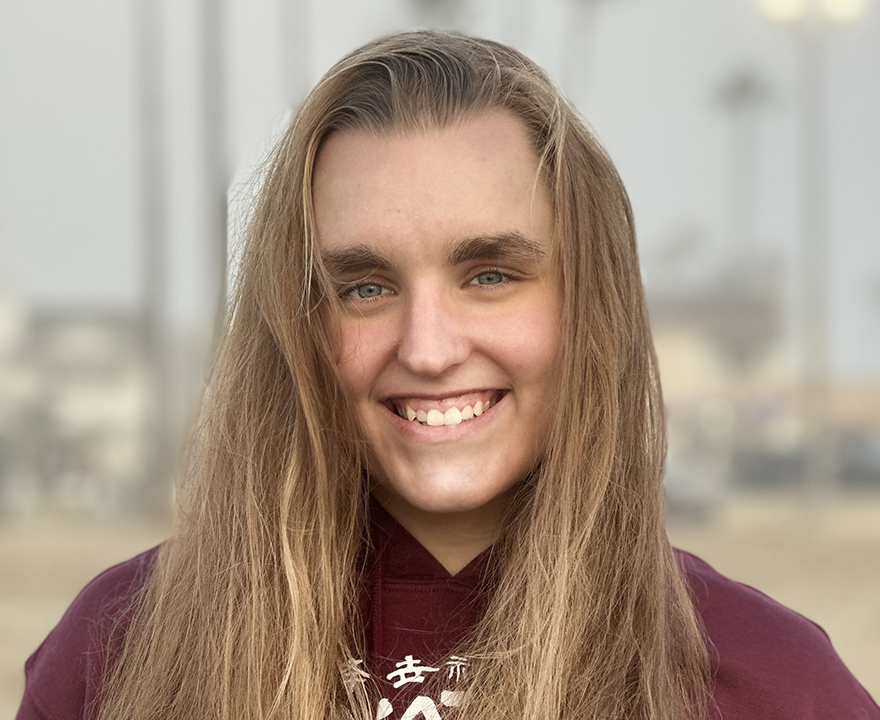Sizzling research

Sizzling research
- April 9, 2024
- UCI undergrad Evgeniya "Jane" Bozhko is studying the potential impact of electric stoves on Korean barbecue businesses
-----
Evgeniya "Jane" Bozhko didn't debate much over whether she wanted to be an Anteater. "Obviously, UC Irvine is a very good research school," she said. "It has a lot of people who are amazing scientists, amazing professors — people who really know what they're doing." With her family already living in Orange County, it was a no-brainer.
Originally from Russia, the family visited California in 2014. They decided to stay permanently, and Bozhko, now a fourth-year undergraduate, still lives with her parents, her brother (the latter now a student at Cal State Fullerton) and their Irish Wolfhound, Phoenix, in Manhattan Beach. "When you move to a different country with a completely different culture, it's always nice to be around family and people that hold your culture close to heart," said Bozhko. "In the end, you don't feel homesick even if you've spent years or even decades in another country."
Bozhko's background drew her to an international studies minor in the School of Social Sciences. "Learning about different cultures, learning about how other countries interact and how the cultures interact as well is a fascinating, fascinating thing," she said. "It does really broaden your perspective on the world."
Bozhko is currently working on an honors paper that marries those interests with her major, which is environmental science and policy. Her honors research is centered on the Environmental, Social & Governance framework, which posits that sustainability is more than strictly environmental. For example, there has been much talk about potential regulations in Orange County to ban cooking on natural gas stoves in the future.
Bozhko, herself an avid cook, became curious how restaurants were responding to this burgeoning shift toward electric stoves in lieu of gas. It became clear that Korean barbeque businesses would be the perfect case study, as those establishments use gas stoves not only in the kitchen but also right on the table. "When you go to an Italian restaurant, you have no way of knowing that it was prepared on a gas stove or not. In the Korean barbecue, it is a part of the cultural aspect of the restaurant," said Bozhko. "You are actually cooking the meal yourself on the gas stove."
She plans to interview local restaurant owners to get their perspectives on the challenges of transitioning to renewable electricity. "I'm currently in the interview stage, but I do have my guesses," she said, speculating that the switch might hurt business of clients who are accustomed to certain traditions. For restaurants in general — not just Korean barbeques — the associated costs as well as the added obstacle of having to wait for electric burners to cool down in an already hectic kitchen environment could be obstacles, as well.
"I assume that a lot of people will say things about the finances, because it is very difficult to change the whole restaurant to accommodate one single idea," she said. "When you cook on a gas stove it is, first of all, much easier, and it doesn't take as much time to cool when you are cooking. Meanwhile, when you use electric stoves, there is an issue where if you're heating it up to the maximum, it takes a lot more time to actually cool down. So in the meantime, your food may well burn."
Bozhko is carrying out her research under the guidance of Eve Darian-Smith, professor and chair of the Department of Global and International Studies in the School of Social Sciences. "I'm very grateful to her that she was able to take me on to write my honors thesis, " said Bozhko. "It's very difficult to express my gratitude with words."
Being speechless is a rarity for Bozhko, who thinks of herself as a good communicator. "For me, it is much easier to communicate the problem to another person than to sit in a lab and try to find a solution to it," she said of the policy portion of her environmental science major.
She puts those skills to use in the Associated Students Senate, where she is this year's physical sciences senator. "Many people might be unaware of the Senate and the fact that, as Senators, we have the power to communicate with the administration to voice the issues that the students are facing," she said.
Bozhko is also vice president of a political club on campus and, as the former treasurer for the lacrosse club, she advises the current treasurer.
After graduating in June, Bozhko plans to work for a year in the environmental field. Then she will apply to law school, perhaps with an environmental focus. In the meantime, she expects to officially become a U.S. citizen and soon after, she hopes to return to UCI for graduate studies. UCI has a strong environmental law program and, of course, it's close to her family. But that's not the only thing that caught Bozhko's eye. She's also become used to the caliber of people who populate UCI.
"Every single professor that I have met in school has brought some new knowledge into my life, whether it be through their subject that they're teaching or whether it be just through personal conversations," she said. "There are some amazing, fascinating individuals at this school."
-Alison Van Houten for UCI Social Sciences
-----
Would you like to get more involved with the social sciences? Email us at communications@socsci.uci.edu to connect.
Share on:
Related News Items
- Careet RightTen of the best higher education books of 2025
- Careet RightNa'puti receives funding for Indigenous research and connections with the canoe at UCI
- Careet RightSocial sciences research at risk
- Careet RightUCI Experts On: Higher education and academic freedom
- Careet RightPolicing Higher Education: The Antidemocratic Attack on Scholars and Why It Matters


